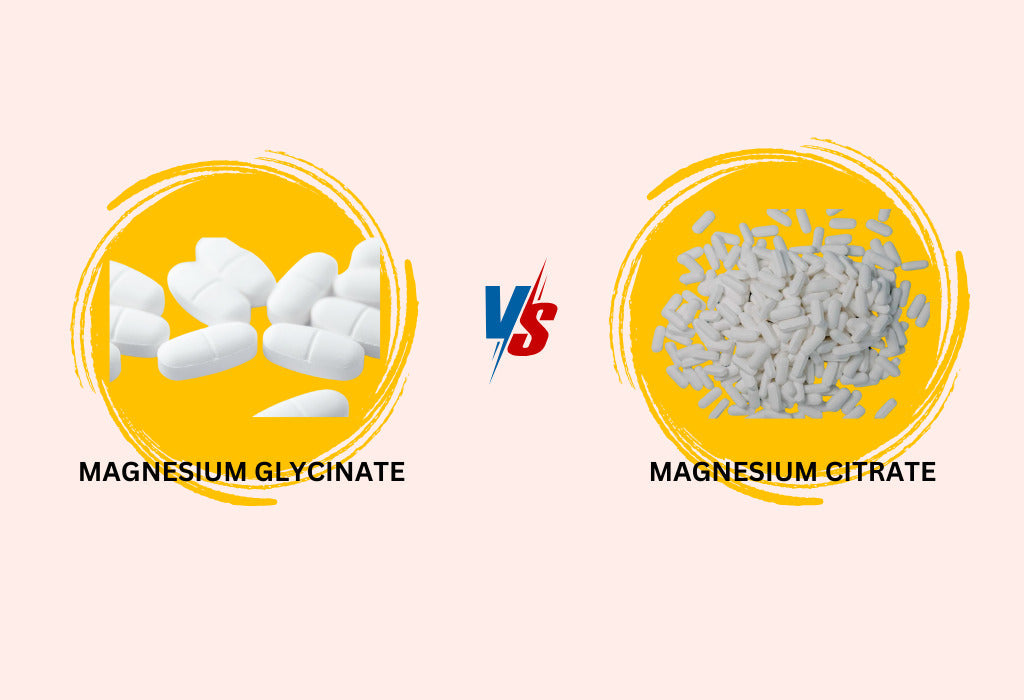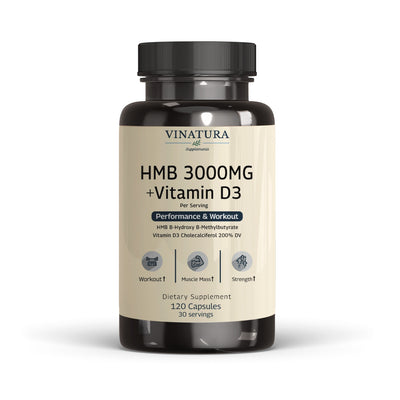
Magnesium Glycinate Vs Citrate: Which Is Better For You?
Magnesium Glycinate vs. Citrate are two popular forms of magnesium supplementation. However, each has its unique advantages, limitations, and recommended dosages, making it essential for consumers to discern which type best suits their needs.
To help with this decision, this article provides comprehensive insights into Magnesium Glycinate and Citrate, allowing you to determine the most suitable way to supply your body with this vital mineral. Don’t miss out on this essential information!
Before exploring further, please read the disclaimer located at the end of this webpage.
Key Takeaways
- Magnesium Glycinate is a combination of magnesium and the amino acid glycine, which is beneficial for improving sleep, appetite, blood pressure, and blood sugar stability.
- Magnesium Citrate is a fusion of magnesium and citrate ions, helpful for electrolyte balance and relieving constipation.
- Consulting a doctor is highly recommended to determine whether Magnesium Glycinate or Magnesium Citrate is appropriate for your specific health concerns.
About Magnesium Glycinate
What Is Magnesium Glycinate?
Magnesium Glycinate is a compound formed from the mineral magnesium and the amino acid glycine [1]. Commonly, it is available in forms like tablets, gummies, or powders. Additionally, you can find this compound naturally in foods such as fish, meat, and dairy products.
The most typical way the body absorbs magnesium glycinate is through balanced nutrition or as a dietary supplement ingested orally, with absorption occurring directly in the small intestine.
Benefits Of Magnesium Glycinate
The unique combination of magnesium and glycine offers remarkable health benefits. Magnesium is vital for over 300 biochemical reactions, helping to regulate emotions, reduce stress, stabilize blood sugar levels, maintain balanced blood pressure, and lower the risk of cardiovascular issues.
Meanwhile, glycine supports protein synthesis, boosts immunity, improves digestion, facilitates neural communication in the brain, enhances sleep quality, strengthens memory, and aids in liver recovery from alcohol-related damage. Together, these two compounds deliver comprehensive support for physical and mental well-being.
About Magnesium Citrate
What Is Magnesium Citrate?
Magnesium Citrate is an excellent electrolyte for human health, though often overlooked as many people opt for oral rehydration salts (ORS) when supplementing electrolytes. Magnesium Citrate is a magnesium supplement combined with citrate ions [2].
Typically, Magnesium Citrate is found in acidic fruits (such as oranges, lemons, etc.) or as dietary supplements in powder form, with concentration levels depending on individual mixing ratios, such as 1:1 or 3:2. Additionally, it can be found in capsule or liquid form.
Like Magnesium Glycinate, Magnesium Citrate supplements magnesium through oral intake, however, the key difference is that Magnesium Citrate is often consumed by mixing the powder with water (or doctor-recommended liquids).
Benefits Of Magnesium Citrate
The primary benefit of Magnesium Citrate is replenishing essential ions to maintain electrolyte balance, reducing the risk of fatigue and dehydration, particularly after intense physical activity or prolonged stress.
Moreover, its magnesium component supports protein synthesis, enhancing immunity, digestion, and nutrient absorption. Magnesium Citrate also helps alleviate constipation, stabilizes nervous system activity, strengthens bones, and reduces irregular heart rhythms.
Magnesium Glycinate Vs. Citrate: Comparison Table
Here's a comparison table for Magnesium Glycinate and Magnesium Citrate:
|
Magnesium Glycinate |
Magnesium Citrate |
|
|
Formula |
Magnesium and Glycine |
Magnesium and Citrate ions |
|
Forms |
Tablets, powder, gummies |
Tablets, powder, gummies |
|
Primary Uses |
Primarily for magnesium supplementation, improving sleep quality, reducing stress,... |
Primarily for magnesium supplementation, relieving constipation, replenishing minerals,.. |
|
Absorption |
High |
High |
|
Bioavailability |
High |
High |
|
Side Effects (high doses) |
Diarrhea, bloating, nausea |
Nausea, discomfort, fatigue, headache |
Magnesium Citrate Or Magnesium Glycinate For Weight Loss

Both magnesium types can enhance digestive function, improving nutrient absorption from your diet and ensuring nutrients are directed to essential organs rather than stored as fat. This can help maintain a healthy weight and reduce fat accumulation.
However, Magnesium Citrate is particularly effective for aiding the body in expelling waste (especially for those with constipation) and is more easily absorbed and utilized. Therefore, if you're considering magnesium for weight loss, Magnesium Citrate is the preferred choice.
That said, exceeding the recommended dose or using it incorrectly can lead to diarrhea. Always consult a doctor for precise guidance on dosage and suitability.
Additionally, relying solely on either magnesium compound without adopting a balanced diet, regular exercise, and adequate rest is unlikely to deliver significant weight-loss results. Overuse of Magnesium Citrate or Magnesium Glycinate can also cause harmful side effects.
Magnesium Glycinate Vs Citrate For Sleep
As mentioned earlier, both Magnesium Glycinate and Magnesium Citrate positively affect the brain and nervous system. If you struggle with falling asleep, staying asleep, or dealing with insomnia, either option could be beneficial.
That said, Magnesium Glycinate is the better choice for sleep-related issues. According to Dr. Faisal Tai, Magnesium Glycinate is an excellent supplement for individuals suffering from insomnia, as it helps reduce stress and pre-sleep tensioner. This compound regulates GABA (a neurotransmitter that signals the brain), helping the brain remain calm. These make Magnesium Glycinate highly effective in improving sleep quality.
Dosage And Side Effects
The recommended daily dosage varies by type and age group. For Magnesium Glycinate, the daily intake is different for each category:
- Men:
- 19 to 30 years old: 400 mg
- 31 years and older: 420 mg
- Women:
- 19 to 30 years old: 310 mg
- 31 years and older: 320 mg
- Children:
- 1 to 3 years old: 80 mg
- 4 to 8 years old: 130 mg
- 9 to 13 years old: 240 mg
- Adolescents:
- Boys 14 to 18 years old: 410 mg
- Girls 14 to 18 years old: 360 mg [1].
For Magnesium Citrate, the recommended liquid dosage is 240 ml per day. You can mix it with water for easier consumption [5].
Exceeding the recommended dosage of magnesium can lead to serious complications such as fatigue, dizziness, lightheadedness, and nausea. It is important to adhere to the prescribed amounts to avoid these adverse effects. If you experience any of these symptoms, it's crucial to consult a healthcare professional promptly.
Best Types Of Magnesium Supplements

The best type of magnesium supplement for your health depends on your goals, physical condition, and individual needs. It’s highly recommended to consult with a doctor to determine the most suitable option for you.
Currently, there are several forms of magnesium supplements, including Magnesium Glycinate, Magnesium Citrate, Magnesium Malate, Magnesium Oxide, and Magnesium Chloride. Each type has its own unique benefits, limitations, and advantages.
When choosing the right magnesium supplement, consider factors like absorption rate, tolerability, bioavailability, convenience, and safety. Alternatively, seek guidance from a healthcare provider for a more informed decision. Regardless of the supplement you choose, maintaining a balanced diet, sufficient sleep and regular exercise is essential for boosting your health, enhancing your immunity, and ensuring optimal results.
Conclusion
By now, you should have a clear understanding of the differences between Magnesium Glycinate vs. Citrate, how to distinguish between them, and their proper use. With this information, you can ensure you're meeting your body's magnesium needs effectively, reaping its benefits without experiencing unwanted side effects. Don't forget to explore other articles on the website for more insights into how to supplement essential minerals for your body effectively.
References
- [1] noble.dana. (2024, February 7). Magnesium glycinate: Is this supplement helpful for you? - Mayo Clinic Press. Retrieved November 18, 2024, from Mayo Clinic Press website: https://mcpress.mayoclinic.org/nutrition-fitness/magnesium-glycinate-is-this-supplement-helpful-for-you.
- [2] WebMD Editorial Contributor. (2020, November 25). Health Benefits of Magnesium Citrate. Retrieved November 18, 2024, from WebMD website: https://www.webmd.com/diet/health-benefits-magnesium-citrate.
- [3] Blades, N. (2024, March 26). Does Magnesium Glycinate Really Help You Sleep Better? Retrieved November 18, 2024, from WebMD website: https://www.webmd.com/sleep-disorders/features/magnesium-glycinate-sleep.
- [4] Wienecke, E., & Nolden, C. (2016). Langzeit-HRV-Analyse zeigt Stressreduktion durch Magnesiumzufuhr. MMW - Fortschritte Der Medizin, 158(S6), 12–16. https://doi.org/10.1007/s15006-016-9054-7.
- [5] Berkheiser, K. (2019, October 28). How Much Magnesium Should You Take Per Day? Retrieved November 18, 2024.
Author

Product Disclaimer
The dietary supplement products mentioned on this website are formulated based on scientific research and adhere to FDA guidelines for dietary supplements. However, the content of the articles has not been evaluated by the Food and Drug Administration (FDA) and is not intended to promote or endorse any specific product. Any products sold on this website are not intended to diagnose, treat, cure, or prevent any disease.
Opinions and Endorsements
Any claims, statements, or opinions expressed in the articles are those of the author(s) and do not necessarily reflect the views or opinions of the manufacturers of the dietary supplement products. The products sold on this website are separate from the content of the articles and are not directly endorsed or associated with the information presented here.
Liability Disclaimer
The author(s) of the articles, website, and manufacturers of the dietary supplement products do not assume any liability for any potential consequences arising from the use of the information provided in the articles. It is recommended that individuals consult with a qualified healthcare professional before making any dietary or lifestyle changes, including the use of dietary supplements.
Product Usage
Please refer to the product labels and packaging for specific usage instructions and guidelines for the dietary supplement products sold on this website.
Customer Support
For any concerns or questions regarding the dietary supplement products, please contact our customer support team, who will be more than happy to assist you.





Leave a Comment
Be the first to comment.
What do you think?